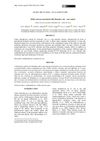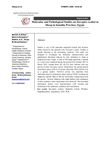 April 2018 in “Journal of Investigative Dermatology”
April 2018 in “Journal of Investigative Dermatology” Cutaneous lupus patients have higher levels of certain immune cells in their blood and skin.
 April 2018 in “Journal of Investigative Dermatology”
April 2018 in “Journal of Investigative Dermatology” IL-17C is important in inflammatory skin diseases and could be a target for treatment.
 April 2018 in “Journal of Investigative Dermatology”
April 2018 in “Journal of Investigative Dermatology” BLZ-100 is safe for use in skin cancer surgery and may help identify cancerous tissue.
 April 2018 in “Journal of Investigative Dermatology”
April 2018 in “Journal of Investigative Dermatology” High amphiregulin in the skin is a bad sign for acute graft-versus-host disease.
 April 2018 in “Journal of Investigative Dermatology”
April 2018 in “Journal of Investigative Dermatology” Finasteride helps female-pattern hair loss.
 82 citations,
August 2017 in “Cell Reports”
82 citations,
August 2017 in “Cell Reports” An imbalanced gut and lack of biotin can cause hair loss in mice.
 53 citations,
April 2021 in “Cell Host & Microbe”
53 citations,
April 2021 in “Cell Host & Microbe” Skin bacteria, specifically Staphylococcus aureus, help in wound healing and hair growth by using IL-1β signaling. Using antibiotics on skin wounds can slow down this natural healing process.
 37 citations,
September 2018 in “Psychoneuroendocrinology”
37 citations,
September 2018 in “Psychoneuroendocrinology” Finasteride treatment in male rats causes long-lasting effects on depression-like behavior, brain cell growth, inflammation, and gut bacteria composition.
 26 citations,
December 2019 in “Neurobiology of Stress”
26 citations,
December 2019 in “Neurobiology of Stress” Post-finasteride syndrome causes lasting sexual, neurological, and physical side effects in some people after taking finasteride.
 26 citations,
October 2017 in “Scientific reports”
26 citations,
October 2017 in “Scientific reports” A special microbe helps plants absorb rock phosphate by growing on their root hairs.
 9 citations,
November 2018 in “Journal of cosmetic dermatology”
9 citations,
November 2018 in “Journal of cosmetic dermatology” Orobanche rapum extract rejuvenates skin and protects skin bacteria, leading to healthier skin.
 June 2024 in “Skin Research and Technology”
June 2024 in “Skin Research and Technology” Red fluorescence in AGA scalps is linked to different microbes.
 August 2023 in “Clinical, Cosmetic and Investigational Dermatology”
August 2023 in “Clinical, Cosmetic and Investigational Dermatology” Research on the human skin microbiome has grown, focusing on skin health and diseases, with more studies needed on antibiotic resistance and AI applications.
 September 2023 in “International Journal of Cosmetic Science”
September 2023 in “International Journal of Cosmetic Science” Both shampoos increased scalp germ numbers but did not change the overall microbial community composition.
7 citations,
September 2020 in “Bioscience Biotechnology and Biochemistry” The scalp has more diverse bacteria, while hair has more bacteria and unique types.
 4 citations,
August 2021 in “Biomedicine & Pharmacotherapy”
4 citations,
August 2021 in “Biomedicine & Pharmacotherapy” 5-alpha reductase inhibitors, like finasteride and dutasteride, may cause depression, but more research is needed to understand why.
1 citations,
January 2024 in “Journal of clinical medicine” Early recognition and treatment of tinea capitis are crucial to prevent severe scalp issues and prolonged therapy.
 April 2024 in “Frontiers in microbiology”
April 2024 in “Frontiers in microbiology” Certain gut bacteria may increase or decrease the risk of male pattern baldness.
March 2024 in “Nutrients” Alopecia Areata is linked to specific gut bacteria and metabolites, indicating a complex gut microbiome.
 January 2022 in “IntechOpen eBooks”
January 2022 in “IntechOpen eBooks” Some lesser-known causes of PCOS include autoimmune issues, genetic mutations, and changes in the body's microbiome.
Four bacteria from the lab were found to be resistant to selenium.
 January 2024 in “Arquivo Brasileiro de Medicina Veterinária e Zootecnia/Arquivo brasileiro de medicina veterinária e zootecnia”
January 2024 in “Arquivo Brasileiro de Medicina Veterinária e Zootecnia/Arquivo brasileiro de medicina veterinária e zootecnia” A cat with ear infection and skin issues was successfully treated for Demodex mites using imidacloprid and moxidectin.
 15 citations,
January 2019 in “Mediators of inflammation”
15 citations,
January 2019 in “Mediators of inflammation” Aloe vera fermentation helps heal burns faster by reducing inflammation and changing gut bacteria.
June 2023 in “International journal of molecular sciences” Heat stress changes goats' skin and hair at the microscopic level and affects their genes and skin bacteria.
 1 citations,
November 2015 in “Indian Journal of Clinical Biochemistry”
1 citations,
November 2015 in “Indian Journal of Clinical Biochemistry” The conference presented findings on how vitamin D levels, genetic factors, and lifestyle choices like smoking and yoga affect various health conditions and diseases.
 1 citations,
September 2010 in “The journal of investigative dermatology/Journal of investigative dermatology”
1 citations,
September 2010 in “The journal of investigative dermatology/Journal of investigative dermatology” The meeting highlighted major advances in skin research, including new findings on skin microbes, genetic links to skin diseases, and improved treatments for various conditions.
 September 2023 in “Clinical, cosmetic and investigational dermatology”
September 2023 in “Clinical, cosmetic and investigational dermatology” SLFC can improve scalp health and reduce sensitive scalp symptoms.
 January 2024 in “Scientific reports”
January 2024 in “Scientific reports” Egyptian Mint effectively kills mosquito larvae and inhibits certain bacteria.
 August 2020 in “Egyptian Veterinary Medical Society of Parasitology Journal (EVMSPJ)”
August 2020 in “Egyptian Veterinary Medical Society of Parasitology Journal (EVMSPJ)” 10.5% of sheep in Ismailia, Egypt, had Sarcoptes scabiei, causing skin issues.
 94 citations,
January 2016 in “Journal of the European Academy of Dermatology and Venereology”
94 citations,
January 2016 in “Journal of the European Academy of Dermatology and Venereology” Sensitive skin is often caused by nerve fibers and environmental factors, and can be managed with mild skincare and professional advice.

























